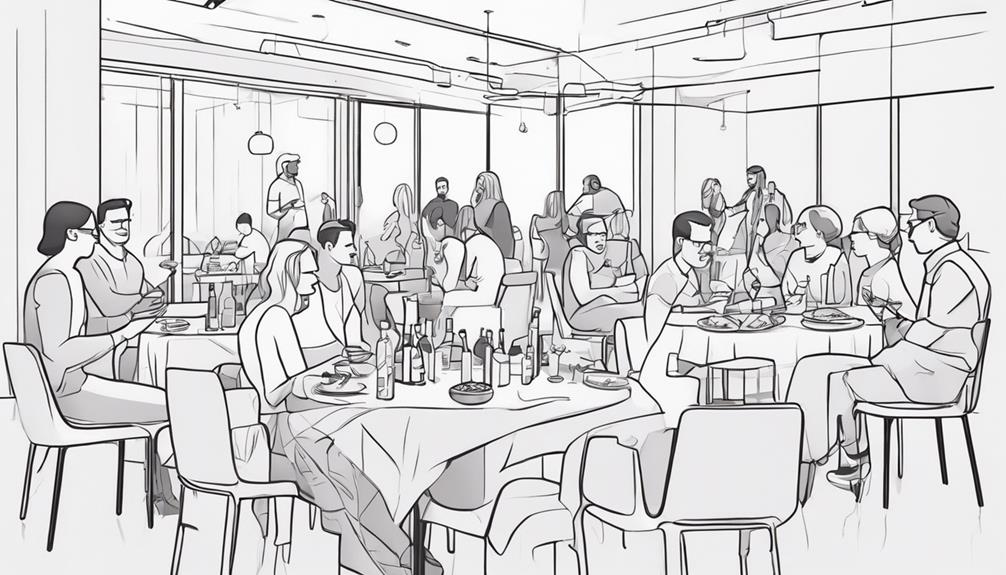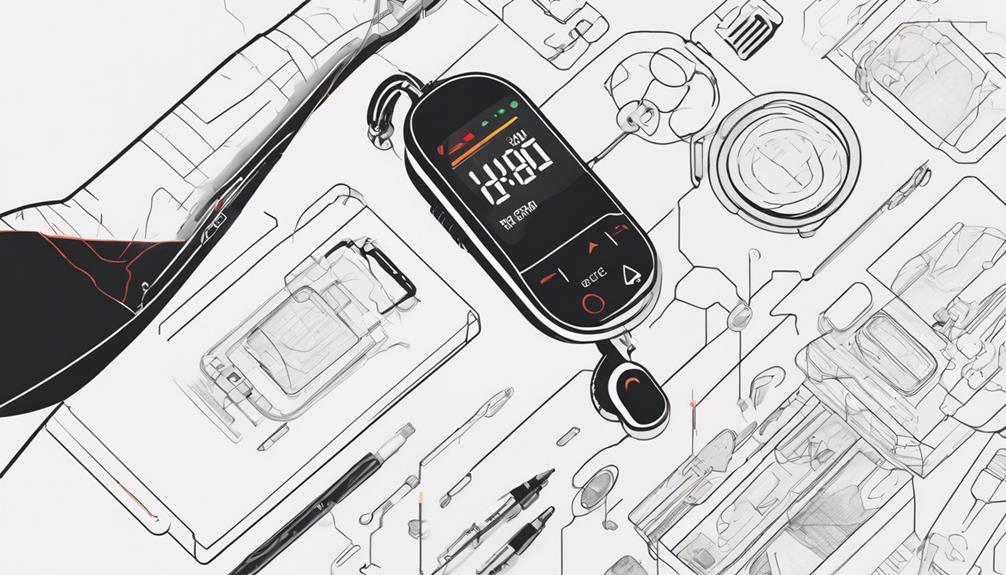Did you know that managing type 1 diabetes goes beyond just watching what you eat? The impact of this condition on your daily life can be profound. From navigating social interactions to dealing with the emotional toll, every aspect of your routine may be influenced.
As you juggle dietary restrictions, continuous monitoring, and exercise challenges, the complexities of managing type 1 diabetes can present unique obstacles. Stay tuned to explore how these factors play a crucial role in shaping your day-to-day experiences.
Key Takeaways
- Support system essential for managing challenges and maintaining well-being
- Clear communication of dietary needs crucial for daily diabetes management
- Continuous blood sugar monitoring vital for timely interventions and improved quality of life
- Healthy coping strategies and emotional support are key for navigating the impact of type 1 diabetes
Social Interactions and Relationships

Living with Type 1 diabetes can significantly impact social interactions and relationships, influencing daily interactions and emotional connections. Your support system plays a crucial role in managing the challenges that come with this condition. Friends and family who understand your needs and provide encouragement can positively influence your mental well-being. On the other hand, peer pressure may arise, especially in social settings where food choices are involved. It's essential to communicate your dietary requirements clearly to prevent misunderstandings and ensure your health is a top priority.
Navigating social situations can sometimes be daunting, but having a strong support system can help alleviate some of the stress. Educating those around you about Type 1 diabetes and how it affects your daily life can foster understanding and empathy. Remember, your health should always come first, even if it means making choices that others may not fully comprehend. Trust in your support system to stand by you and provide the encouragement needed to maintain positive relationships while managing Type 1 diabetes effectively.
Dietary Restrictions and Meal Planning
Understanding the dietary restrictions associated with Type 1 diabetes is essential for effective meal planning and overall health management. To navigate these restrictions successfully, consider the following:
- Carb Counting and Insulin Dosing: Learn how to accurately count carbohydrates in your meals to match insulin doses appropriately, ensuring blood sugar levels remain stable.
- Recipe Modifications: Make necessary adjustments to recipes by using low-carb alternatives, sugar substitutes, and portion control to meet dietary requirements without compromising taste.
- Food Swaps: Explore various food swaps such as using zucchini noodles instead of pasta or cauliflower rice instead of regular rice to reduce carbohydrate intake while still enjoying your favorite dishes.
- Consultation with a Dietitian: Seek guidance from a dietitian specialized in diabetes management to create personalized meal plans that align with your nutritional needs and insulin regimen. Their expertise can help you maintain a balanced diet while managing blood sugar levels effectively.
Continuous Blood Sugar Monitoring

For optimal management of Type 1 diabetes, continuous monitoring of blood sugar levels throughout the day is crucial in maintaining stability and preventing potential complications. Technology advancements have revolutionized blood sugar monitoring, allowing for the development of continuous glucose monitoring systems that provide real-time data on glucose levels. These devices use sensors inserted under the skin to measure glucose levels in the interstitial fluid, offering a more accurate reflection of blood sugar trends than traditional fingerstick tests.
Continuous blood sugar monitoring enables you to make informed decisions about insulin dosages, diet adjustments, and lifestyle changes. By tracking your glucose levels throughout the day and night, you can identify patterns, understand how different foods affect your blood sugar, and make timely interventions to prevent hyperglycemia or hypoglycemia.
Incorporating continuous blood sugar monitoring into your daily routine may require lifestyle adjustments, such as carrying the monitoring device with you, staying alert to alerts and alarms, and learning to interpret the data provided. However, these adaptations are essential for enhancing your diabetes management and improving your overall quality of life.
Physical Activity and Exercise Challenges
Navigating physical activity and exercise with Type 1 diabetes presents unique challenges that require careful monitoring and adjustment. When managing Type 1 diabetes, engaging in physical activity can lead to fluctuations in blood sugar levels, necessitating a tailored approach for insulin management.
Here are four key considerations to help you maintain a balance between staying active and managing your diabetes effectively:
- Timing of Exercise: Plan your workouts strategically around your insulin doses and meal times to prevent sudden drops or spikes in blood sugar levels during physical activity.
- Monitoring Blood Sugar Levels: Regularly check your blood sugar before, during, and after exercise to understand how your body responds and make necessary adjustments to your insulin intake.
- Hydration and Nutrition: Stay well-hydrated and consume snacks with a balanced mix of carbohydrates and proteins to sustain your energy levels and prevent hypoglycemia or hyperglycemia.
- Consultation with Healthcare Provider: Work closely with your healthcare team to develop a personalized exercise plan that aligns with your insulin regimen and overall diabetes management goals.
Emotional Well-being and Mental Health

Managing Type 1 diabetes effectively involves acknowledging the significant impact of emotional well-being and mental health on overall health outcomes. Coping mechanisms play a crucial role in navigating the daily challenges of living with diabetes. Developing healthy coping strategies such as mindfulness, exercise, or engaging in hobbies can positively influence emotional well-being. Support systems, including friends, family, and healthcare providers, are vital in providing encouragement and assistance in managing the emotional toll of the condition.
Stigma and misconceptions surrounding diabetes can contribute to increased stress and anxiety levels. Addressing these misconceptions through education and open communication can help alleviate some of the emotional burden associated with the condition. It's essential to recognize the psychological aspects of diabetes and seek professional help when needed.
Frequently Asked Questions
How Can Individuals With Type 1 Diabetes Navigate Dating and Romantic Relationships While Managing Their Condition?
When managing type 1 diabetes in dating, set clear boundaries for sharing medical information. Communicate openly about your needs and how your partner can support you. Build a strong support system for moments of vulnerability.
Are There Any Specific Tips for Managing Type 1 Diabetes During Social Gatherings or Events Where Food and Drinks Are Involved?
When managing type 1 diabetes during social gatherings with food and drinks, it's key to strike a balance. To handle cravings, plan ahead by bringing low-carb snacks. If alcohol is involved, monitor intake, opt for lower-sugar options, and stay hydrated.
How Can Individuals With Type 1 Diabetes Handle Misunderstandings or Stigma From Friends, Family, or Colleagues Regarding Their Condition?
When faced with misunderstandings or stigma about your type 1 diabetes, workplace challenges can arise. Implement coping strategies like educating others and setting boundaries. Cultivate support systems and use effective communication techniques to navigate these situations confidently.
What Are Some Strategies for Traveling With Type 1 Diabetes and Ensuring Proper Care While on the Go?
When traveling with type 1 diabetes, keep emergency supplies handy for blood sugar monitoring. Store insulin properly. Plan meals and snacks to manage levels. Stay hydrated, move regularly, and communicate your needs. Prioritize self-care to enjoy your journey while managing your health effectively.
How Can Individuals With Type 1 Diabetes Address the Impact of Their Condition on Their Self-Esteem and Self-Image in Social Settings?
When managing self-esteem and self-image with type 1 diabetes in social settings, seek support groups for camaraderie and coping strategies. Consider therapy options to address mental health. These resources can empower you to navigate challenges confidently.
Conclusion
In conclusion, living with type 1 diabetes can have a significant impact on daily life. From managing social interactions and relationships to dealing with dietary restrictions and continuous blood sugar monitoring, individuals face numerous challenges.
For example, Sarah, a 25-year-old diagnosed with type 1 diabetes, must carefully plan her meals and monitor her blood sugar levels throughout the day, impacting her ability to fully engage in social activities and causing additional stress.
The daily struggles faced by those with type 1 diabetes highlight the importance of ongoing support and understanding in managing this chronic condition.